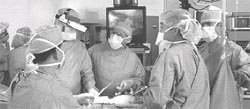Breathe easy
 that wound infections are common and serious complications of surgery is widely known. About 5 per cent of all patients who have undergone surgery and as many as 10 to 20 per cent undergoing colorectal surgery have postoperative infection in hospitals in the developed west. It is significantly higher in poorer countries in the absence of the requisite sterile facilities to prevent hospital infections. What is more, such infections lead to longer periods of hospitalisation which means patients would have to spend more money too. Surgical wound infections could decrease a patient's chances of survival despite successful surgery.
that wound infections are common and serious complications of surgery is widely known. About 5 per cent of all patients who have undergone surgery and as many as 10 to 20 per cent undergoing colorectal surgery have postoperative infection in hospitals in the developed west. It is significantly higher in poorer countries in the absence of the requisite sterile facilities to prevent hospital infections. What is more, such infections lead to longer periods of hospitalisation which means patients would have to spend more money too. Surgical wound infections could decrease a patient's chances of survival despite successful surgery.
The rate of infection from surgical wounds can be cut in half simply by giving patients more oxygen during and after anesthesia claims a new study led by Daniel Sessler from the University of California, San Francisco. The dramatic finding of reduced infections with increased oxygen is based on a study of 500 patients who underwent surgery in three European hospitals ( The New England Journal of Medicine, Vol 342, No 3).
In the study, patients undergoing surgery for colon cancer or inflammatory bowel disease were randomly assigned to breathe one of two oxygen concentrations during and for two hours after surgery. One group was given 30 per cent oxygen as is routine; the other group received 80 per cent oxygen. Both groups received identical amounts of anesthesia. Using two different methods, the scientists measured the availability of oxygen to the patients' tissues. As might be expected, those breathing extra oxygen had more oxygen in their tissues. As a result, they had half as many wound infections as those who breathed the conventional 30 per cent oxygen. Surgical wound infections developed in 28 of the 250 patients given 30 per cent oxygen, but only in 13 of the 250 patients on the 80 per cent oxygen regimen.
Six of the patients given conventional oxygen died within 15 days of surgery, while only one patient given 80 per cent oxygen died. In all cases, the cause of death was overwhelming infection, the scientists reported. Though striking, the difference is not statistically significant, they noted.
The increased oxygen inhaled by patients during and after surgery appears to improve their immune system's ability to fight infections. Immune cells called neutrophils normally kill invading bacteria by exposing them to a highly reactive form of oxygen. This is the most important immunologic defence against bacteria associated with surgery, and there is enough data available to show that the number of bacteria killed is directly linked to the amount of oxygen in wound tissues. In the new paper, the scientists report that breathing extra oxygen markedly increases the amount of oxygen available to neutrophils.
"We now have evidence that increasing oxygen levels during and just after anesthesia provides the immune army with more ammunition to kill bacteria at the wound site,' said the lead author director of the international Outcomes Research Group ( org ) that carried out the study. This research is the outcome of a unique collaboration between uc San Francisco and European investigators who studied patients at the Donauspital- smzo in Vienna, the University of Vienna and the University Hospital Eppendorf in Hamburg, Germany.
What is more, patients in the study who developed wound infections required an additional week of hospitalisation, a result consistent with previous studies showing that wound infections cost an average of us $12,500 per patient. In contrast, "Medical oxygen costs only a thousandth of a cent per quart,' Sessler points out. "It is 40 times less expensive than tap water.'
Related Content
- India's plan to breathe easy is out, but targets are not legally binding
- Scientists create device to detect cancers through breath
- Nipah virus: Kerala breathes easy as officials say no fresh cases since May 30
- Delhi and NCR begin to breathe easy as stubble fires doused
- A long way to go before we can breathe easy
- Breathe easy at airport with 4 air pollution controllers
